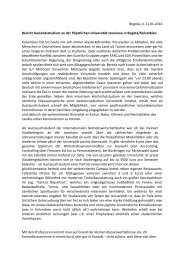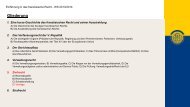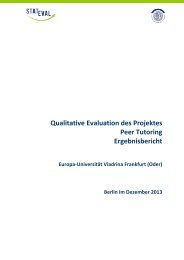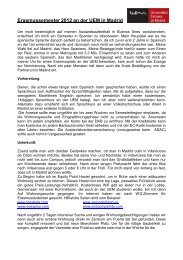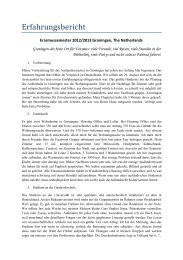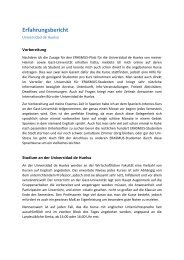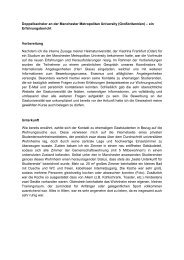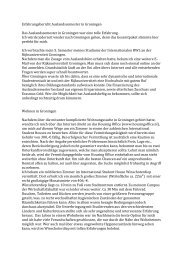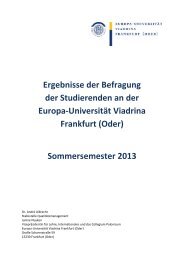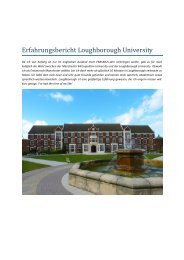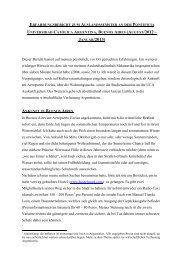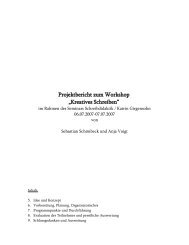Dariusz Aleksandrowicz Aleksandrowicz - Europa-Universität ...
Dariusz Aleksandrowicz Aleksandrowicz - Europa-Universität ...
Dariusz Aleksandrowicz Aleksandrowicz - Europa-Universität ...
Create successful ePaper yourself
Turn your PDF publications into a flip-book with our unique Google optimized e-Paper software.
D. <strong>Aleksandrowicz</strong>: The Socialist City and its Transformation 7<br />
with was a continuation of the respective relation between the plant and the city in<br />
the changed situation of the post-communist period. At that time, that is at the begin<br />
of 90’s, all of the best land around Naberezhnye Chelny belonged to Kamaz. The<br />
plant has bought this land from the surrounding collective and state-owned farms -<br />
the kolkhozes and the sovkhozes. Kamaz has exercised political influence to move<br />
the farms to sell the land, despite of the resistance of their staff “Kamaz is an empire,<br />
it can exercise power.” 12 The chief argument in the bargaining could in turn be easily<br />
used as a purely ideological one. It referred to the needs of the workers of Kamaz<br />
who are looking for new houses to be built – a slogan which was impressive for<br />
minds that grown up on ideas once promoted by the communists. 13<br />
Unlike the conditions of the Soviet society, there are now some capitalist elements<br />
that determine the situation of the involved actors. Among others, it is land property<br />
(although there is still no genuine private land property) as an important factor in the<br />
context of the economic game. Methods used by the plant to improve its position in<br />
the new context, however, follow from the old repertoire. They consist in political<br />
pressure and ideological argumentation. It is therefore still the standing of the actors<br />
within the distribution of political power that decisively influences the results of this<br />
special type of competition. 14<br />
The respective evolution, the core of which is the specific constellation of economic<br />
and of political factors, occurred also within Kamaz itself. The former socialist<br />
“production plant” acquired some features of an “enterprise” and it became divided<br />
into what in Poland is being called “nomenclatura joint-stock companies.” This is a<br />
special type of organization of an enterprise in the transitory period that in a peculiar<br />
way combines politics and economy. The semi-owners of the companies<br />
usually come from the ranks of the former members of the communist nomenclatura 15<br />
(usually of the leadership of the respective plant). In post-communist Russia, there<br />
are hardly the rules of the market that form the framework of the nation-wide economic<br />
process. Therefore, individuals involved into networks emerging from the<br />
system of the nomenclatura are in a position to implement the political means at<br />
their disposal in order to approach economic objectives. At the same time, they<br />
12<br />
Unauthorized record of an interview with Director of Kamaz Incorporated Design and Production<br />
Company Nilov W. Stepanovitsh. The interview was organized by Peter Marcuse at September<br />
15th 1993. At the interview participated except Marcuse and myself also Amine Benaissa,<br />
James Hansen and Alastir McAuley.<br />
13<br />
In fact, building of dwelling place for workers has been at that time drastically reduced as compared<br />
with the communist period.<br />
14<br />
Also the question as to whom - to the city or the plant - should the biggest hotel in the town<br />
belong, was to be answered according to the very same mechanism. It was to be decided by way of<br />
political power-play and not, for instance, with respect to some legally defined procedure.<br />
15<br />
The term was originally used in the official Soviet language. It referred to all positions in the<br />
system for the performance of which the individual was to be “named” by the executive of the<br />
Communist Party at the respective level of Party’s hierarchy. It gained then international and<br />
theoretical relevance owing to the book of Voslensky (1980).



